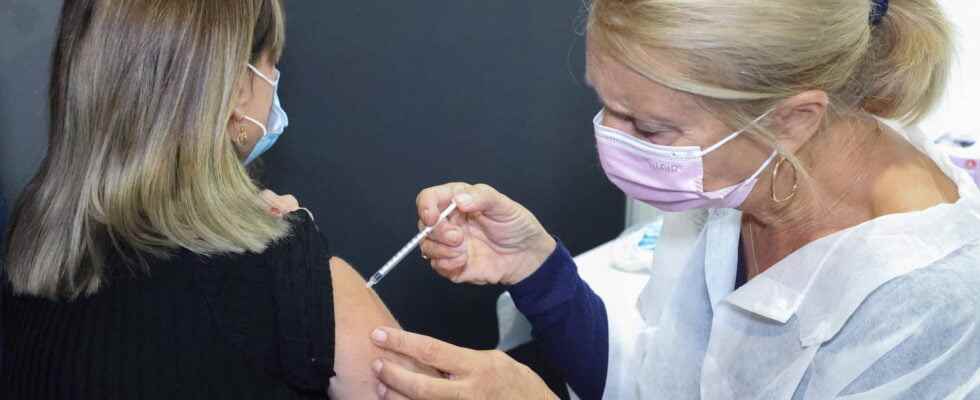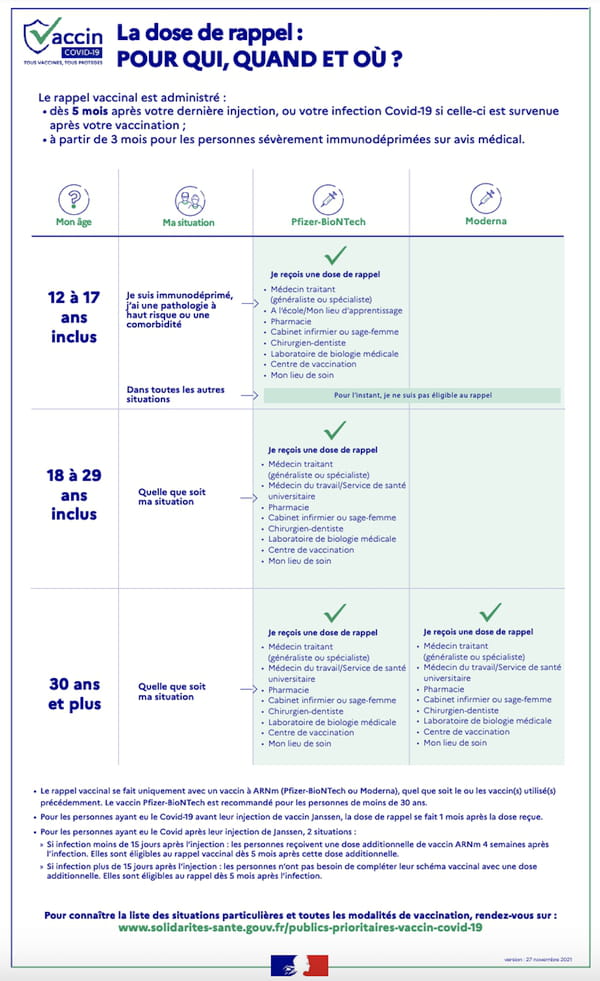3RD DOSE. Several changes in the COVID-19 vaccination booster campaign have recently been announced by the government with in particular the shortened time between the primary vaccination and the booster, the Covid-19 positivity and the 3rd dose, its effectiveness. .. The Internet user takes stock.
[Mis à jour le 7 janvier 2021, à 17h12] The Covid-19 vaccination booster campaign will intensify in the coming days. The time between primary vaccination and booster dose will be four months maximum, against seven today, from February 15, announced the Minister of Health and Solidarity Olivier Véran in the Sunday Newspaper, on January 2. A new measure, which aims to strengthen the government’s strategy of focusing on vaccination and the recall campaign against Covid-19 but also to increase pressure on unvaccinated people. “We have decided to change these rules, but leaving everyone the time to make their reminder: from February 15, it will take four months – and no longer seven – after your second dose to have a vaccination schedule. complete “indicated Olivier Véran before adding that” in this course, an infection will always be equivalent to an injection. This means that a person who has his two doses, has not yet been recalled but has recently been infected by the virus meets the conditions set “.
A new change in the recall campaign to speed up the implementation of the government’s vaccination strategy. “So that everyone can have their vaccination pass on February 15, I am therefore setting the most ambitious collective goal in the history of vaccination in our country: together, we must achieve at least 25 million injections in five weeks. That is to say on average nearly 5 million injections per week. It would be a logistical feat never seen before “, commented the Minister of Health. The government will use great means to achieve its objectives. “In January, we will receive 13 million doses of Pfizer and 25 million booster doses of Moderna. Alongside vaccination centers, pharmacists, town doctors and midwives, we will further increase our efforts with the reinforcement of firefighters, soldiers, civil security associations, rescuers… “, affirmed Olivier Véran.
A new lever to accelerate the vaccine booster campaign which could potentially soon be joined by an additional measure, that of the implementation of a 4th dose to complete its vaccination schedule. Where Israel has already adopted it for the 60 years and over and the immunocompromised, it is, for the moment, only considered in France – although Olivier Véran assured, this Monday, January 3 at the microphone France Inter, that “when we have the data from Israel, I imagine that we will move”, explaining that “the question of a new dose of vaccine will arise quite quickly for the fragile people in our country, the immunocompromised people or very old “.
You tested positive for Covid-19 after your first vaccination, when to recall?
Have you been infected after your primary vaccination and not sure if the booster dose applies to you? According to government prerogatives, this is the case! Indeed, the Minister of Health and Solidarity Olivier Véran had indicated it on November 25, 2021: “For those who have been infected, the rule is simple: an infection = an injection. If you have been infected and you have had your last injection more than 5 months ago [3 mois depuis le 28 décembre, ndlr], get vaccinated with the “booster”.
Which vaccine to choose between Pfizer and Moderna for its 3rd dose?
A question often comes up, can we choose which product to be vaccinated with. It depends: not all vaccination sites offer the same possibilities to choose your vaccine between Pfizer and Moderna. In early December, France had many more doses of Moderna (20 million) than Pfizer (6 million). In addition, you should know that a vial of Pfizer contains seven administrable doses, while those of Moderna contain between 20 and 24 doses. Widely used in vaccination centers, you are therefore more likely to be vaccinated with the product from the Moderna laboratory.
The Haute Autorité Sanitaire (HAS) specifies that whatever the vaccine is first injected, the booster dose must be given by the injection of a messenger RNA vaccine, therefore either the product developed by Pfizer or that of Moderna.
- For those under 30, you should get your booster dose with the Pfizer vaccine. “In the population under 30, the risk of myocarditis appears to be about 5 times lower for Pfizer’s Comirnaty vaccine compared to Moderna’s Spikevax vaccine in 12-29 year olds,” HAS said in a press release, published on 8 November.
- If you are over 30, you have a choice regarding the third injection against Covid-19 between Pfizer and Moderna. On the other hand, in terms of efficacy, the product developed by Moderna, “whose vaccine efficacy seems slightly better” is recommended for people over 30 years old for the booster dose, especially for people at risk of severe disease. .
Faced with the outbreak of the Covid-19 epidemic in France, Jean Castex announced at a press conference on Monday, December 6, the opening of vaccination for children aged 5 to 11 at risk of develop severe forms. The vaccination campaign for this group of people will be open from this Wednesday, December 15.
The vaccination booster corresponds to the administration of an additional dose of vaccine as early as 5 months after the last dose of the initial vaccination schedule or after a proven Covid-19 infection if this has occurred after vaccination. In the event of an infection occurring after the second dose, the third dose is still necessary: it must be carried out within a minimum of 5 months and up to 6 months and 4 weeks after infection. These deadlines should increase to 4 months on January 3, 2022 as announced by Jean Castex on Friday December 17.
This booster dose, often defined as a booster, is intended to maintain a high level of protection by stimulating the immune system once again. In fact, the immunity obtained by vaccination gradually decreases from the sixth month even if it remains effective against severe forms. Faced with the Delta variant, which is particularly contagious, the effectiveness of vaccines against the rate of transmission of the disease had already fallen by 40% according to the World Health Organization (WHO). The recent emergence of the Omicron variant (classified as of concern by the WHO) is also leading to a booster vaccination in all adults.
Many wonder about the delay in effectiveness of the booster dose. On December 9, Alain Fischer, who coordinates the State’s vaccine strategy against the Covid-19 pandemic, answered this question: “The protection conferred by the third dose appears seven days after the booster, and not after 48 hours. It takes time for the cells to reactivate and the immune response to kick in. It continues to rise after a week, “he said.
What about the effectiveness of the booster dose against the Omicron variant? If the first studies transmitted by the laboratories suggest that a complete anti-Covid vaccine regimen is probably less effective against the new variant, the third dose seems to allow the antibodies to “regain a greater capacity to neutralize the virus”, indicates Inserm, the national institute of health and medical research. Regarding deaths, the Drees recently published a report in which it states that while “vaccine protection against death in the first months after achieving a full regimen is high for all age groups, ranging from 90% to 95%” , this protection against death “then weakens over time after obtaining the complete pattern until it drops to around 80%” … to rise to around 98% after the injection of the reminder to people “including the full status goes back more than 6 months “.
As when the vaccination campaign was in full swing at the start of the year, it is possible to get vaccinated in various places. Olivier Véran explained that “we are going to open, reopen or expand the existing vaccination centers”, counting around 11,000 throughout France, and recalled that doctors, pharmacies, midwives, nurses, physiotherapists or the biological laboratories are authorized to administer the vaccine.
Everything has been put in place by the executive to encourage vaccination and recall, in a context of a strong recovery in the circulation of Covid-19 and concern around the new variant. To this end, if you are one of the eligible audiences, you can make an appointment via online appointment booking platforms, such as Doctolib, Vitemadosis or KelDoc. You can also consult the lists of vaccination centers near you on Maiia and Santé.fr, or on your city’s website. Finally, you can contact 0 800 009 110 in order to reserve a vaccination slot – if you are abroad, you can contact the Embassy or consulate of your place of residence for this purpose.
Do you want to have your booster dose done but are worried about the side effects of it? Do not worry: the side effects recorded for the booster dose are more or less the same as those experienced during the injection of the 2nd dose. In other words, beyond a slight pain in the arm, you will probably feel more or less fatigue, headaches, muscle aches, body aches and perhaps a fever. On West France, Dr Muriel Alvarez, infectious disease specialist in charge of the Covid crisis unit at the Toulouse University Hospital, clarified: “We do not find side effects other than what had already been observed during the administration of the first and second doses The main side effects that are encountered are minor, called immunogenic, that is to say linked to our reaction to the vaccine: fever, body aches, headaches – as if we were a little sick in fact – and which disappear 24 hours later, or even a few days after “.
The National Agency for the Safety of Medicines and Health Products (ANSM) confirms, for its part, that the recurring adverse effects following the injection of the booster of the anti-Covid vaccine are mainly pain at the injection site and / or a reaction at the injection site (redness, hives, swelling, fatigue, headache, stomach pain, joint pain, arthralgia, fever, myalgia, chills, diarrhea, nausea or even vomiting, insomnia, excessive sweating, night sweats, decreased appetite, feeling weak or low on energy or drowsiness, pain in extremity (hands, feet), swelling of the lymph nodes, feeling sick, itching at the injection site , dizziness, hypoaesthesia (decrease in touch or sensation).

